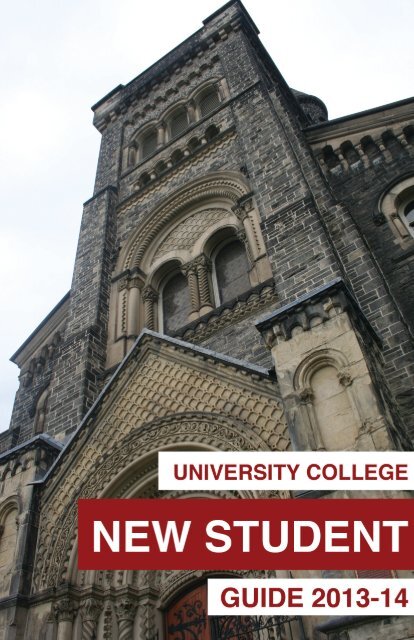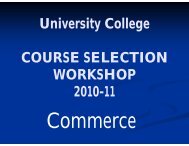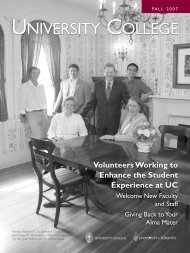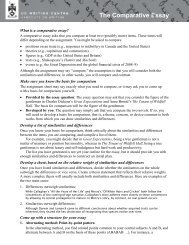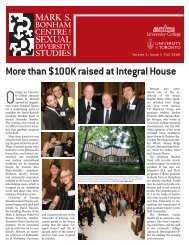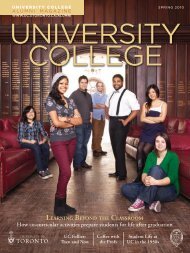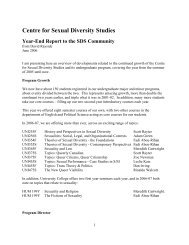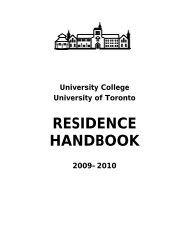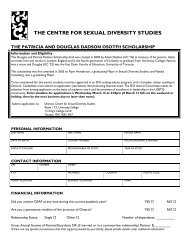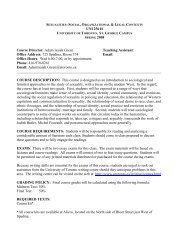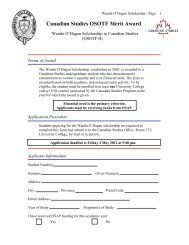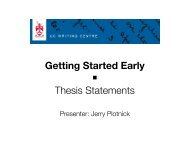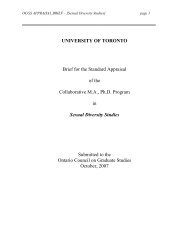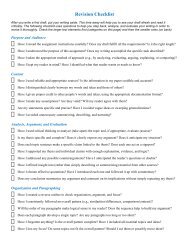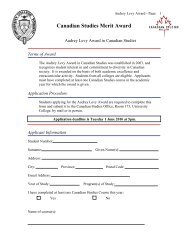Create successful ePaper yourself
Turn your PDF publications into a flip-book with our unique Google optimized e-Paper software.
WELCOME TO UNIVERSITY COLLEGEDear <strong>Student</strong>,Welcome to <strong>University</strong> <strong>College</strong> at the <strong>University</strong> of Toronto! Your years at UC will give you moreopportunities, challenges, and transformative experiences than you can now imagine. When yougraduate, you’ll join the <strong>College</strong>’s alumni community that includes politicians, entrepreneurs,community activists, artists, doctors, and more. We’re thrilled to have you with us.UC is the <strong>University</strong>’s founding college, established in 1853. Our beautiful main building is a nationalhistoric site. We are proud of the traditions of academic excellence and diversity that youwill soon recognize in our students, faculty and staff. Our faculty are leading researchers andteachers from a range of disciplines across Arts and Science, and, as a UC student, you can turnto them with academic questions about your areas of interest. The <strong>College</strong> also sponsors threeinterdisciplinary programs (Canadian Studies, Cognitive Science, and Health Studies) and is affiliatedwith the Centre for Drama, Theatre, and Performance Studies and the Mark S. BonhamCentre for Sexual Diversity Studies.You might also be interested in a special UC initiative for first-year students: “UC One: EngagingToronto.” UC One helps students acquire the skills they’ll need to succeed at U of T, no matterwhat field they choose to specialize in, and gives them the tools to apply what they learn in theclassroom to the world around them. <strong>Student</strong>s in UC One take one special seminar, with anenrollment of 25 or fewer, in addition to four other regular Arts and Science classes; the yearincludes field trips, special co-curricular events, and numerous visits from leading Torontonians.Check out www.uc.utoronto.ca/ucone/.If you’ve looked through the Arts and Science Calendar and Timetable, you already know thatthere is a rich array of courses and programs at U. of T. There is a lot to know, even before classesstart. This guide is published by the UC Registrar’s Office to help you figure out where to startand how to choose your courses. Please read it carefully along with the Welcome <strong>Guide</strong> <strong>2013</strong>-<strong>14</strong>that you received with your offer of admission on the “Join UofT” portal: https://join.utoronto.ca/The UC Registrar’s Office is here to help you – it’s your ‘Reliable First Stop’ for any questions youhave at U. of T. We offer academic, personal, and financial advice and we can also point you toother resources on campus that will be helpful to you. During the month of July, the Registrar’sOffice gives a number of Course Selection and Registration workshops to help guide you intoyour first year. Be sure to attend! Throughout the year individual counselling appointments areavailable as well as group information sessions to help you decide your next steps. We hope youwill make yourself at home in our office.We wish you all the best for a successful and rewarding university career,Donald C. AinsliePrincipal, Associate ProfessorDepartment of PhilosophyShelley CornackRegistrarU N I V E R S I T Y C O L L E G E | N E W S T U D E N T G U I D E 3
COURSE SELECTIONHow do I decide what courses to take?You have already thought in broad termsabout the kind of program(s) you would liketo follow. You do not apply to your specificprograms until the end of your first year, butyou do need to have an idea of specific programsyou are interested in, in order to takethe required 1st year courses.Look at the list of possible programs andtheir required 1st year courses on the A &S website: www.artsci.utoronto.ca/newstudents/courses/programsAll programs are open to you, as long asyou have the Gr. 12 pre-requisites for the1st year courses (if any) and you meet theprogram entry requirements (often a certainmark in the 1st year required course(s)). So,even if you were accepted to sciences, youmay take an arts program and vice versa,as long as you successfully complete the requiredcourses.In first year, you should be choosing all firstyear (100-level) courses. There are some200-level courses that do not have pre-requisitesand are open to first year students.However, please discuss any 200-levelcourse choices with an academic counselorin the Registrar’s office. Do not attempt300/400 level courses until after 2nd year.A full-time course load is 3.0+ credits. Sincea degree requires 20.0 credits, most studentstake 5.0 credits each year to finish in 4years (although this is not required).The Faculty of Arts & Science offers someunique course opportunities open only to firstyear students: First-Year Seminar courses(199s) and <strong>College</strong> One courses. Thesecourses are designed to introduce you touniversity scholarship in a small class setting(max. 24 students). You can read moreabout these in the A&S Welcome <strong>Guide</strong> oron the A&S website.Course descriptions for the 199 Seminars:www.artsci.utoronto.ca/current/undergraduate/first-year-seminars.Course descriptions for <strong>College</strong> One courses:www.artsci.utoronto.ca/futurestudents/academics/college-one-programsBoth of these course options are a great wayto help satisfy the Breadth requirement foryour degree (see description under ‘DegreeRequirements’ in the Calendar: http://www.artsandscience.utoronto.ca/ofr/calendar)Your objective in choosing courses for firstyear is to obtain the prerequisites and backgroundfor more than one program for secondyear. Give yourself lots of options – youmay want to change your mind/direction.This is a great time to explore subjects thatinterest you that you couldn’t take in highschool (e.g. Anthropology, Cinema Studies).Example Course ChoicesSocial Sciences:GGR107H1 + GGR124H1, SOC102H1 +SOC103H1, POL101Y1+ 2.0 electivesLife Sciences:BIO120H1 + BIO130H1, CHM138H1 +CHM139H1, MAT135H1 + MAT136H1,PHY131H1 + PHY132H1+ 1.0 electiveHumanities:ENG<strong>14</strong>0Y1, SPA100Y1, HIS109Y1,PHL100Y1+ 1.0 electivesCommerceECO100Y1, MAT133Y1, RSM100Y1+ 2.0 electives4 N E W S T U D E N T G U I D E | U N I V E R S I T Y C O L L E G E
How do I enrol in courses?1. Read through the following documents:Welcome <strong>Guide</strong> (uoft.me/welcomeguide)Calendar (uoft.me/artscicalendar)Timetable (uoft.me/artscitimetable)2. Make a preliminary list of courses (firstyear required courses for your intended programsas listed in the Calendar) and draft atimetable.3. Before your course start date (July 30th)check the Arts and Science website for anychanges to the Calendar and/or Timetable.4. Make a list for easy reference when yougo online to enroll in your courses. For eachcourse, you will need the full course code(eg. MAT135H1), section code (F, Y, or S),and meeting section (eg. L0101, T0101,and/or P0101).5. Have some backup courses ready in caseany of your first choice classes are unavailable.6. Enroll in courses on ROSI starting July30th (be sure to look up your exact start timeafter July 22nd).For complete instructions, please refer to the Registration Handbook and Timetableon the Faculty of Arts and Science website.Are there workshops to help me select courses?Yes, the Registrar’s Office offers detailedcourse selection workshops throughout July.There is no need to register for workshops inadvance. All sessions take place in <strong>University</strong><strong>College</strong>, room 161 (directly across fromthe Registrar’s Office).Commerce <strong>Student</strong>sMonday, July 8, from 1-3pmHumanities and Social Science*Wednesday, July 3, from 1-3pmWednesday, July 24, from 1-3pmComputer ScienceWednesday, July 10, from 1-3pmSciences**Friday, July 5, from 1-3pmFriday, July 26, from 1-3pmAll Disciplines (Late Session)Friday, August 30, from 1-3pm* Commerce students may attend, if unableto attend other sessions.** Computer science students may attend,in unable to attend other sessions.U N I V E R S I T Y C O L L E G E | N E W S T U D E N T G U I D E 5
FREQUENTLY ASKED QUESTIONSHow do I use the Calendar and RegistrationHandbook and Timetable?Read the Calendar for descriptions of allcourses and programs (Subject POSts) offeredin the Faculty of Arts and Science.Courses are listed under their respectiveDepartments/<strong>College</strong> sponsors, which arelisted alphabetically (Commerce is underRotman Commerce). The Calendar also includesFaculty rules and regulations, suchas degree requirements and codes of conduct,which you are responsible for knowing.The Registration Handbook and Timetablegives the days/times courses are offered sothat you can create your schedule. It alsolists special enrolment instructions undereach department heading in the timetablesection. It has step-by-step instructions onhow to select courses and register.How do I know if I’m taking the rightcourses for the subject POSt I wantto enter at the end of first year?Each program description in the Calendarlists the courses required to be taken in firstyear and any minimum marks/requirementsnecessary to be accepted to that programfor second year. You can also ask for advicefrom the UC Registrar’s office if you are unsureor have questions.Should I take a first-year seminar?Seminar courses are a unique opportunityto be part of a small class experience andget to know your professor. They are also intendedto help you fulfill the breadth requirementfor your degree. They are completelyoptional, but only available in your first year.Should I avoid taking course sectionsthat are at the same time?Yes. ROSI will not check for timetable conflicts,so make sure you don’t have anyclashes. Once you have enrolled in yourcourses, view your personal timetable onROSI to double check for any problems.What do the codes in the timetablemean?The are numerous codes that are used inthe Registration Handbook and Timetable.Course Codes (PSY100H1)The first three letters of a course code refersto the subject of the course. The nextthree letters indicate the year of a course(e.g. 100 indicates first year, 200 indicatessecond year, and so on). The final letter in acourse code indicates the credit value of thecourse (e.g. H indicates 0.5 credits, Y indicates1.0 credits). The final number refers tothe campus location (e.g. 1 indicates it is aSt. George campus course).Section Codes (F, S, or Y)This indicates when the course is being offered.‘F’ and ‘S’ courses are offered in thefirst and second semester of the session,respectively. A ‘Y’ code indicates the courselasts a full academic session.Meeting Section Codes (L0101)There are three types of meeting sectioncodes: Lectures (e.g. L0101), tutorials (e.g.T0201), and practicals (e.g. P0102). Allcourses have an ‘L’ section and some requireyou select a tutorial (‘T’) or practical(‘P). If these are listed in the Calendar, youmust select one in addition to the lecturesection.Alternating Section CodesThe symbol (A) following a time indicates“alternate weeks”. Science labs markedthis way are held every other week. Thismeans that you can schedule your labs sothat they fall on the same day of the weekat the same time, e.g. one week BIO120H,one week CHM138H. To make sure yourchoices of labs (P sections) alternate correctly,choose sections that end in differentdigits, for example, P0401 for BIO120H andP0402 for CHM138H. Read the instructionsin the Timetable under each subject headingfor more information.6 N E W S T U D E N T G U I D E | U N I V E R S I T Y C O L L E G E
Waitlist Indicator CodesMany courses have waiting lists indicated by‘Y’ in the Wait List column of the RegistrationHandbook and Timetable. If a course is fullyou may put yourself on the waiting list andcheck back on ROSI to monitor your rank.Location CodesMany locations will be missing from thelistings, or simply state “central”, “east” or“west”. Be careful scheduling classes immediatelyfollowing one another that takeyou from one end of campus to the other(i.e. west to east, because it may be difficultto get there in the 10 minutes betweenclasses). Other than that, feel free to takeany combination of central/east/west. Theactual location of your classes will be listedin the Timetable once they are finalized andare usually available on ROSI when you enrolin a class.Date and Time CodesEach day of the week is associated with aletter code. Each of them should be intuitive(Monday = M, Tuesday =T, etc.) with theexception of Thursday which is indicated bythe letter ‘R’.Also, unless otherwise indicated, lecturesare 50 minutes long, starting at 10 minutesafter the hour until the next hour.What do all of the punctuation symbolsin the Calendar mean?A comma, semicolon, ampersand, brackets,and/or plus sign all mean ‘AND’. Aforward slash means ‘OR’. For example ifa course requirement lists “(CHM138H1,CHM139H1)/ CHM151Y1”, that means youmust take both CHM138H1 and CHM139H1or just CHM151Y1.What are ‘Big Ideas’ courses?The most challenging problems of our complex,interconnected world do not always fallneatly into academic disciplines, typicallyrequiring creative solutions that bridge traditionalboundaries of thought. Big Idea coursesprovide entering undergraduate studentsa unique opportunity to engage with stellarinstructors and stimulating peers in an enrichedlearning experience that addressesa number of the most crtitical societal problemsof today.An interesting aspect of these courses isthat they will satisfy 1.0 FCE in any breadthrequirement category!For more information, please visitwww.uoft.me/bigideasEnrolment IndicatorSome courses give priority (P) or are restricted(R, RP) to students in certain yearsor programs of study (these programs arelisted beside the Enrolment Indicator code).Other courses (E, PE, AE) require enrolmentthrough the departmental office. Please consultthe Timetable or the Registrar’s Office ifyou have questions.If I don’t have ‘priority’ for a course Iwant to take, when can I enroll?You may add these courses starting at 6amon August 8th. If there is no space availableat that time, you are welcome to add yourname to the waitlist.U N I V E R S I T Y C O L L E G E | N E W S T U D E N T G U I D E 7
DEGREE REQUIREMENTSDegree TypeHonours Bachelor ofArts & Honours Bachelorof ScienceBachelor of CommerceNo. of Credits 20.0 20.0 (10.0 RSM/MGT courses,10.0 other A&S courses)Level of Credits- Maximum 6.0 100-level- At least 6.0 300- and400-level- Maximum 6.0 100-level- At least 6.0 300/400-level,including at least 1.0 400-levelProgramRequirements- 1 Specialist, or- 2 Majors*, or- 1 Major + 2 Minors** Must consist of 12.0different courses.Specialist in:- Management, or- Accounting, or- Finance & EconomicsCGPA 1.85 1.85BreadthRequirementMust take at least 4.0 credits from the followingcategories:1. Creative and Cultural Representations (CCR)2. Thought, Belief and Behaviour (TBB)3. Society and Its Institutions (SII)4. Living Things and their Environment (LTE)5. The Physical and Mathematical Universes (PMU)Credits must be either:(a) 1.0 credit in each of 4 of the 5 categories, or(b) 1.0 credit in each of 3 of the 5 categories and 0.5credits in each of the other two categories.Some restrictions on the acceptability of breadth coursesapply to Commerce students (see Calendar).8 N E W S T U D E N T G U I D E | U N I V E R S I T Y C O L L E G E
How can different kinds of programs be combinedin an Honours degree?A quick look at the Calendar will show youthat there are literally hundreds of combinationsof programs that can lead to an HonoursBachelor’s degree. First year is yourchance to explore a number of exciting subjectsoffered by the Faculty of Arts and Science.Remember that you don’t have to selectthe program or programs you intend tofollow until you have completed 4.0 credits(typically at the end of your first year).Here are a few examples:Bachelor of Commerce- Specialist in Accounting (15.0 credits)- Elective courses (5.0 credits)Bachelor of Commerce- Specialist in Management (12.0 credits)- Elective courses (8.0 credits)Honours Bachelor of Science- Major in Nutritional Science (8.0 credits)- Minor in Biology (4.0 credits)- Minor in Economics (4.0 credits)- Electives (4.0 credits) *Honours Bachelor of Science- Specialist in Biology (12.0 credits)- Electives (8.0)Honours Bachelor of Arts- Major in Employment Relation (7.0 credits)- Major in French Language (8.0 credits)- Electives (5.0 credits) *Honours Bachelor of Arts- Specialist in Political Science (10.0 credits)- Electives (10.0 credits)*With program combinations of 2 Majors or1 Major and 2 Minors, more electives canbe included in your degree if some requiredcredits overlap between the various programs.However, not all program combinationswill have overlapping courses. The ruleis that any minimum program combinationfor a degree must consist of at least 12.0different credits. If you choose similar programs,follow this minimum rule.ACADEMIC INTEGRITYWould you trust a brain surgeon that cheated through medical school? Would you hirea lawyer who used cheat notes during an exam? Would you drive a car designed by anengineer who copied lab reports?The vast majority of students are honestand hard-working. But sometimes, evenhonest people make bad decisions and accidentshappen. Even if you think you knowthe rules, double-check. The consequencesof not knowing the rules can be severe, andinclude failed courses, suspension, and, invery serious cases, permanent expulson.Learn how not to plagiarize here:www.uoft.me/noplagiarismTop 5 Tips for Exam Writing:1. Listen to and follow all instructions.2. Leave unauthorized aids in your bag.3. A cellphone is an unauthorized aid.4. “Stop writing” means stop writing.5. Keep your eyes and thoughts toyourself.Review the Academic Code of Behaviour:www.uoft.me/acbU N I V E R S I T Y C O L L E G E | N E W S T U D E N T G U I D E 9
TUITION AND RESIDENCE FEESTuition Fees Domestic <strong>Student</strong>sProgram Fees(Full-time)AcademicFeesIncidentalFees*Total FeesAll First Year Programs $ 5 865 ~ $ 1 100 $ 6 965Commerce (2nd-4th year) $ <strong>14</strong> 556 ~ $ 1 100 $ 15 656Computer Science (2nd-4th year) $ 10 466 ~ $ 1 100 $ 11 566Tuition Fees International <strong>Student</strong>sProgram Fees(Full-time)AcademicFeesIncidentalFees*Total FeesAll First Year Programs $ 32 075 ~ $ 1 100 $ 33 175Commerce (2nd-4th year) $ 37 961 ~ $ 1 100 $ 38 061Computer Science (2nd-4th year) $ 34 542 ~ $ 1 100 $ 35 642Program fees are charged for students taking a full-time course load (3.0 - 6.0 full courseequivalents (FCEs) per year). <strong>Student</strong>s taking 3.0 credits or more (Sept-April) as ofSeptember 22, <strong>2013</strong> are charged the same amount of tuition fees regardless of thenumber of courses in which they have enrolled or end up completing. Part-timestudents taking 2.5 credits or less during the academic year are charged on a per coursebasis ($1173/full year course).* Incidental fees are approximate; exact fees will be posted on the Fees website at theend of July.Residence Fees (Domestic & Internatonal)Plan APlan BRoom $ 6 934* $ 6 934*Food $ 4 437 $ 3 917Residence Council $ 15 $ 15Total $ 11 386 $ 10 866* The price of a room varies depending on size, single or double occupancy, etc. For adetailed breakdown of room pricing, please visit www.uc.utoronto.ca/housing.Financial Resource OfficesUofT Admissions and Financial Aid OfficeOntario <strong>Student</strong> Assistance Plan (OSAP)National <strong>Student</strong> Loans Service CentreCredit Canada (credit counseling and financial advice)www.adm.utoronto.cawww.osap.gov.on.cawww.canlearn.cawww.creditcanada.com10 N E W S T U D E N T G U I D E | U N I V E R S I T Y C O L L E G E
FEES PAYMENT AND DEFERRALHow do I pay my fees?Fees invoices are available online. Invoicesfor student fees are not mailed. Shortlyafter courses have been added, studentscan print an invoice from ROSI (www.rosi.utoronto.ca) and take it to any major Canadianbank for payment. Payment can also bemade via online banking (the account numberwill be on the top right hand corner ofthe ROSI invoice). Keep your stamped FeesInvoice as your proof of payment. For onlinebanking, print the confirmation screen. Fortelephone banking, record the confirmationnumber and print your banking records.You cannot pay in person at the <strong>University</strong>.When do I pay my fees?The deadline to pay or defer your fees isAugust 20th. You must pay at least theminimum payment indicated on your feesinvoice (65% of your total fees) or request todefer your fees by this date. Be sure to keepyour proof of payment!If you miss the August 20th deadline, yourcourses will be cancelled. Don’t let this happento you!What does it mean to “defer yourfees”?If you are eligible to ‘defer your fees’ (seenext question), the <strong>University</strong> will allow youto register without paying the ‘Minimum Paymentto Register’ amount on your invoice.This is permitted because there is proof thatyou will be receiving funding to help payfor your fees and the university knows thismoney will not be available until after the feepayment deadline has already passed.For further information about fees payment,including methods of payment from outsideof Canada, payment via sponsor, or as astaff/faculty dependent, please visit:www.fees.utoronto.caWho can defer fees?<strong>Student</strong>s receiving provincial or US governmentstudent loans, as well as those receivingscholarships may defer their fees.Provincial or US Government LoansIn order to be eligible to defer payment ofyour tuition fees you should apply for OSAP(Ontario <strong>Student</strong> Assistance Program) fundingby June 15th. Applications for OSAP aresubmitted online at http://osap.gov.on.ca/Once your invoice is available, you may requesta Tuition Fee Deferral on ROSI underthe ‘Financial Accounts’ section. Just followthe instructions online.If you have any problems with the online deferralapplication, you may bring your OSAP“Notice of Assessment” to the <strong>University</strong> <strong>College</strong>Registrar’s Office, showing the amountof funding you will be receiving for the year.<strong>Student</strong>s Receiving ScholarshipsUofT scholarships will be credited to your financialaccount on ROSI in late September.If some or all of your fees are covered bya scholarship or other award you can bringyour scholarship letter(s) to the Registrar’sOffice to request a deferral. If your scholarshiponly covers part of your minimum payment,you should pay the difference at thebank and present your proof of payment tous when you request your deferral.How do I pay with an RESP?Most RESP companies have a standardform that must be filled out by the Registrar’sOffice every year. You may bring or send inthe form to the office once you have acceptedyour Offer of Admission. We can submit itdirectly to the RESP company. If your companydoes not have a form, you can requesta letter from us.If you have not received your funds fromyour RESP by August 2oth, you must stillmake your minimum payment by that date.You are not eligible to defer your fees.U N I V E R S I T Y C O L L E G E | N E W S T U D E N T G U I D E 11
FEES FREQUENTLY ASKED QUESTIONSWhat is the easiest way to pay fees?Online banking. This will save you a lot oftime and hassle in your 4+ years at U. of T.With online banking you do not need a feesinvoice. You can easily set up U. of T. as apayee by using the account no. on the topright corner of your invoice (a combinationof your last name and student no.). You cansimply check your balance on ROSI, make apayment and print your confirmation screenas your proof of payment.How much do I have to pay?The minimum payment is indicated on yourinvoice and is 65% of your fees for the year.The minimum payment must be made bythe Aug. 20th deadline. If you are receivingOSAP or other government loans you maydefer your fees, ie. request not to make apayment until the money is received. Youdefer fees on ROSI.When do I have to pay the secondinstallment of my fees?You have until the end of the Session (ie.April 30, 20<strong>14</strong>) to completely pay your fees.However, you will receive a service charge(1.5% per month) on any outstanding balancestarting November 15th and on the15th of each month following until your balanceis $0.Do I need a new invoice if I makechanges to my couses?No. The bank requires the invoice to directyour payment to the correct account, butthey do not require the amount owing andamount paid to correspond. If you makecourse changes, you can check your newamount owing on ROSI and adjust your paymentas necessary.How do I know if the <strong>University</strong> hasreceived my payment?If you can see your payment on ROSI in yourFinancial Account, your payment has beenreceived. Payments normally take 3-5 daysto show up on ROSI after paying throughyour bank.When and how will I receive my loanfrom OSAP?If you applied for OSAP by the June 15thdeadline, your OSAP funding should beavailable on the first day of classes or shortlythereafter. If you applied later, your OSAPwill arrive later.You should have printed an MSFAA (Master<strong>Student</strong> Financial Assistance Agreement)when you printed the signature pages of yourOSAP application. This will allow OSAP todeposit your funding directly into your bankaccount. The MSFAA needs to be submittedto a Canada Post outlet along with yourSIN card, a government issued photo ID andyour banking information (a void cheque orprintout from your bank) once you’ve submittedyour OSAP application online. You willalso need to confirm/update your incomeon the OSAP website after school starts inSeptember. You will receive 60% of yourfunding in September. The remaining 40%will be deposited in January provided youmaintain a 60% course load in each term (ie.3 or more courses in both first and secondterms).Dropping courses can have serious implicationsfor your OSAP.If I’m receiving OSAP and my feesare deferred, when do I have to pay?You should be sure to make a payment towardsyour fees by November 15th in orderto minimize service charges. Most studentswith OSAP can only pay 60% of their fees byNov. because OSAP only provides 60% ofthe loan in 1st term. The remainder is paidwith the 2nd OSAP instalment in January.Some service charges are unavoidable.12 N E W S T U D E N T G U I D E | U N I V E R S I T Y C O L L E G E
Are there bursaries and scholarshipsavailable to students withextra financial need?If you have unmet financial need beyondwhat OSAP has granted you, you will be assessedby UTAPS – see next question. Youmay also apply for a bursary through theRegistrar’s Office beginning October 1st.We accept applications in first term, and insecond term. Please consult the Registrar’sOffice for application deadlines.There are in-course scholarships availableto students at the end of each year. However,these awards are based on GPA andare meant as recognition of outstandingachievement rather than as significant financialaid.What is UTAPS?UTAPS (<strong>University</strong> of Toronto AdvancedPlanning for <strong>Student</strong>s) is a bursary fund thathelps students whose need has been assessedby OSAP as greater than the maximumfunding that OSAP awards ($11,880).UTAPS funding is paid to students in November.You will be automatically consideredif you applied for OSAP on time andare receiving maximum OSAP.<strong>Student</strong>s receiving loans from other provincesneed to apply for UTAPS More informationis available on the Enrolment Serviceswebsite: http://www.adm.utoronto.ca/U N I V E R S I T Y C O L L E G E | N E W S T U D E N T G U I D E 13
BUDGET PLANNINGTake some time now to review your resourcesand expenses for the upcomingyear. Try to create a realistic budgetthat is balanced and that you can stick to.Planning ahead will reduce the chance ofhaving a problem during the term. Runningout of money before the end of the year (atthe same time as your exams) can be verystressful.BUDGET FOR THE ACADEMIC YEAR (SEPT. - APRIL)IncomeExpensesSavings(beforepaying fees)Tuition FeesEarnings from Part-Time Work (duringschool year)Books and SuppliesComputerFamily ContributionGovernment LoansResidence/RentFurnishingsFoodGovernmentBenefitTransportationScholarship/AwardsTelephone/InternetTax Refund/GST RebateMedical/Dental/OpticalOtherOtherTotalTotal<strong>14</strong> N E W S T U D E N T G U I D E | U N I V E R S I T Y C O L L E G E
DISCOVER CAMPUS LIFEThe UC Success Centre is designed tosupport students academic and personalsuccess. The Centre provides easy accessto essential campus services by bringingthem directly into the <strong>College</strong>. UC studentswill have the opportunity to meet with an International <strong>Student</strong> Advisor from the Centre forInternational Experience, participate in career development workshops organized by theCareer Centre, attending programming by Health and Wellness or speak with an onsitesocial worker as part of Counselline.PEER MENTORSHIP PROGRAMSOur peer mentorship programs connect first-year studentsto upper-year students who can act as a source of information,advice, and support as they adjust to university life.Mentors facilitate workshops, coordinate social outings, andprovide 1-on-1 support related to academic, personal, andother concerns.To learn more and/or sign-up for one of our mentorship programs,please visit www.uoft.me/ucmentor today!DIABOLOS’ COFFEE BARDiabolos’ is a student-run, fair trade, environmentally-consciouscoffee bar at UC serving hot and cold drinks and acariety of pastries, wraps and meals. Vegetarian, vegan andorganic options are available, as well as classics such asroast beef, turkey, egg salad, and tuna sandwiches. Diabolos’is known for its relaxed atmosphere, friendly staff andgreat music.www.uc.utoronto.ca/diabolosCOMMUTER STUDENT CENTREThe UC Commuter <strong>Student</strong> Centre (CSC) is a space designedspecifically to cater to the needs of off-campus students.The CSC uniquely offers space to study and socialize,while providing resources to make commuting easier,including lockers, a kitchenette, printing station, free tea,and so much more!The CSC is located in the UC Union at 79 St. George St.U N I V E R S I T Y C O L L E G E | N E W S T U D E N T G U I D E 15
ORIENTATION <strong>2013</strong>Looking for the beginning of your <strong>University</strong>Life? Look no further than <strong>University</strong> <strong>College</strong>Orientation <strong>2013</strong>! Immerse yourself insix fully-packed days of new friends, communityand a sense of where to start at U ofT. Orientation is a week-long event open toover 700+ incoming <strong>University</strong> <strong>College</strong> students,just like you! The event is hosted bysenior <strong>University</strong> <strong>College</strong> students and providesevents designed to help student transitioninto university life including: academicseminars about useful resources such asthe UC Writing Centre and Registrar’s office,wellness sessions for student health andstress prevention, and social events suchas Amazing Race and Beach Day. Thereare also many more events that encouragestudent engagement, opportunities to makenew friends and get in touch with your newcommunity.This year’s theme is ‘The UC Knights Tale’based off the majestic identity of UC (it doeslook like a castle after all!). Being a knightrequires a sense of identity and as new students,we challenge you to discover youridentity through your transition to university.Orientation Week runs fromMonday, September 2nd toSaturday, September 7th.Early Bird Fee: $105.00(until June 30, <strong>2013</strong>)Regular Fee: $115.00(July 1 - 31, <strong>2013</strong>)Late Fee: $125.00(August 1 - 20, <strong>2013</strong>)Final Registration Date: $135.00(September 2, <strong>2013</strong>)For more information and toregister, visit us online:www.ucorientation.ca16 N E W S T U D E N T G U I D E | U N I V E R S I T Y C O L L E G E
U N I V E R S I T Y C O L L E G E | N E W S T U D E N T G U I D E 17
DISCOVER CAMPUS LIFEALTERNATIVE ORIENTATIONAlternative Orientation is a two day program for incomingfirst-year students planned by the Office of the Dean of <strong>Student</strong>sat UC. The program consists of a series of workshopsand events that will prepare you for your first day of classand connect you to the <strong>College</strong> community.For more information about the schedule and how to register,please visit www.uoft.me/alternativeMY DEFINITION: LEADERSHIP RETREATMy Definition is a leadership retreat where incoming studentsmeet one another at the <strong>College</strong> before the start ofthe year. While generally geared towards incoming studentswho plan to commute during their first year of university, thisyear there will be a limited number of spaces for residencestudents! The retreat is organized and facilitated by the UCOff-Campus Commission. This year’s retreat is Aug 10-11th.For more information, please visit www.uoft.me/mydefSTUDENT-FACULTY DINNERSThroughout the academic year, UC Principal Donald Ainsliehosts dinners intended to provide students with an opportunityto interact with faculty in an informal setting. Each dinneris targeted towards different members of the UC communityand are designed to help students and faculty shareexperiences and learn from each other.If you are interested in attending a dinner, please check theUC website in the Fall.UC RESIDENCE COUNCILThe <strong>University</strong> <strong>College</strong> Residence Council (UCRC) was createdin 1992 by residence students who wanted to take amore active role in residence. The council organizes events,provides services, and helps establish equitable communitystandards to improve residence life. The UCRC is made upof House Presidents and an executive council.Look out for ‘The Big Event’ in early September!18 N E W S T U D E N T G U I D E | U N I V E R S I T Y C O L L E G E
UC DAY: ORIENTATION <strong>2013</strong>Come and meet the membersof the Registrar’s Office andother <strong>College</strong> staff.Get to know all the resourcesUC has for you! Meet otherfirst-year and senior students.Ask any last minute academicand financial questions youmay have.There will be a clubs fair, toursof UC and the surroundingarea, and prizes! Lunch is alsoprovided.Open to ALL new UCstudents, free!Tuesday, September 3, <strong>2013</strong>10:30 am - 2:30 pmUC Main Building15 King’s <strong>College</strong> Circle(if you are not attending the full weekOrientation, please check in at theUC main entrance by 10:15am.INTERNATIONAL STUDENT LUNCHWe want you to know aboutthe vast array of resourcesavailable to you as an internationalstudent!This is a great opportunity tomeet and talk to other new andupper-year UC internationalstudents and UC staff, includingUC’s International <strong>Student</strong>Advisor, Suying Hugh.We hope you’ll come and lookforward to meeting you soon!Thursday, September 5, <strong>2013</strong>12:00 pm - 2:00 pmUC Main Building15 King’s <strong>College</strong> CircleCroft Chapter HouseRegister atwww.uoft.me/intllunchU N I V E R S I T Y C O L L E G E | N E W S T U D E N T G U I D E 19
COLLEGE RESOURCES & SUPPORTSRegistrar’s OfficeThe staff in the Registrar’s Office providehelp, counselling and information to UCstudents. We offer academic, personal andfinancial advice, help with course and programselection, OSAP, scholarships, andbursaries, and interpretation of <strong>University</strong>rules and regulations.15 King’s <strong>College</strong> Circle, Rm. 157Telephone: (416) 978-3170Email: uc.registrar@utoronto.caOffice of the Dean of <strong>Student</strong>sThe Dean of <strong>Student</strong>s and her staff providelife skills and student involvement supportfor all UC students. They work closely withstudent leaders, residence dons and communitycoordinators to provide social, transition,and academic programming, as well asindividual support.15 King’s <strong>College</strong> Circle, Rm. 105Telephone: (416) 978-2530Email: uc.dean@utoronto.caThe UC Writing CentreQualified tutors help students to improvetheir writing and research skills. Summerworkshops are available for first-year studentsand individual counselling is availablethroughout the year to help with planning,organizing, writing and revising academicpapers.15 King’s <strong>College</strong> Circle, Laidlaw LibraryWebsite: www.uc.utoronto.ca/writing-centreLaidlaw LibraryThe UC Library is one of our best kept secrets!It offers plenty of study space, a computerlab and printing services, as well asspecialized collections supporting UC’s interdisciplinaryprograms.15 King’s <strong>College</strong> Circle, 2nd floorWebsite: www.uc.utoronto.ca/libraryThe Success CentreThe Success Centre provides easy accessto essential campus services by bringingthem directly into the <strong>College</strong>, including anInternational <strong>Student</strong> advisor, Social Workers,career workshops, and health and wellnessprograms.15 King’s <strong>College</strong> Circle, Rm 259Email: uc.studentlife@utoronto.caWebsite: www.uoft.me/successcentreThe Commuter <strong>Student</strong> CentreThis unique space provides a study area,multipurpose lounge, kitchen, and lockersfor commuter students. There is a wide arrayof programs and activities, as well asindividual counselling support.79 St. George StreetWebsite: www.uoft.me/cscUC Advancement OfficeThe Advancement Office is your connectionto the college after you graduate. Thestaff supports current students through theCareer Mentorship Program by matchingstudents with alumni to learn about careeroptions after graduation.15 King’s <strong>College</strong> Circle, G-wingTelephone: (416) 978-2968UC Literary and Athletic SocietyThe UC Lit is the student government at the<strong>College</strong> and also happens to be the oldestdemocratically elected student governmentin the country! They are broadly responsiblefor representing student interests, organizingevents and activities that promotecommunity-building, as well as providing keystudent services.President: Nishi Kumar (president@uclit.ca)15 King’s <strong>College</strong> Circle, Jr. Common RoomTelephone: (416) 979-2500Website: www.uclit.ca20 N E W S T U D E N T G U I D E | U N I V E R S I T Y C O L L E G E
UNIVERSITY RESOURCES & SUPPORTSFor a complete listing of campus resources and supports, please consult theCalendar at www.artsandscience.utoronto.ca/ofr/calendar/Academic Success CentreWorkshops and individual assistance withtime management, exams, reading, memoryand other aspects of study.2<strong>14</strong> <strong>College</strong> StreetTelephone: (416) 978-7970Website: www.asc.utoronto.caAccessibility ServicesFacilitates the inclusion of students withdisabilities into all aspects of university life,including development of self-advocacy andacademic skills.Telephone: (416) 978-8060Website: www.uoft.me/accservCareer CentreOnline access to part-time, full-time, summerand volunteer listings. Workshops suchas resume clinics and interview techniques.2<strong>14</strong> <strong>College</strong> StreetTelephone: (416) 978-8000Website: www.careers.utoronto.caCentre for International ExperienceOffers services, programs and facilities forinternational students and students with internationalinterests.33 St. George StreetWebsite: www.cie.utoronto.caHealth Services andCounseling & Psychological ServicesOffers a wide range of counselling andpsychological services for issues such asdepression, anxiety, disordered eating, phobias,problems with sleep, etc. Counsellingis also available for depression, transition issuesand family difficulties.Telephone: (416) 978-8070Website: www.uoft.me/healthwellness<strong>Student</strong> Housing ServiceProvides an online registry of accommodations,maps, legal information, and an EmergencyHousing Coordinator for students facinga temporary housing crsis.2<strong>14</strong> <strong>College</strong> StreetTelephone: (416) 978-8045Website: www.housing.utoronto.caFirst Nations HouseA meeting place that encourages and supportsAboriginal students in their pursuit ofhigher education.563 Spadina Avenue, 2nd floorWebsite: www.fnh.utoronto.caSexual and Gender Diversity OfficeDedicated to making the university communitycelebrate sexual and gender diversitythrough lesbian, gay, bisexual, transgender,queer resources and programs.21 Sussex AvenueTelephone: (416) 946-5624Website: www.sgdo.utoronto.caCommunity Safety OfficeProvides assistance and support to thosethat have had their personal safety compromised,develops and delivers educationalinitiatives that address personal safety.(www.communitysafety.utoronto.ca)21 Sussex AvenueTelephone: (416) 978-<strong>14</strong>85Website: www.communitysafety.utoronto.caSexual Harassment & Education OfficeInformation and support for all members ofthe UofT community.40 Sussex AvenueTelephone: (416) 978-3908Website: www.utoronto.ca/shoU N I V E R S I T Y C O L L E G E | N E W S T U D E N T G U I D E 21
FIRST YEAR LEARNING COMMUNITIESA First-Year Learning Community(FLC) is a smallgroup of students who cometogether to create a communityof learners. Thereare 24-30 students in eachlearning community whotake two or three coursesin common, belong to thesame college or program,and meet regularly fromSeptember to April. Meetingsare facilitated by an upper-year student peer mentorunder the guidance of astaff and faculty advisor.Why join an FLC and whois eligible?First-Year Learning Communities(FLCs, pronounces“flicks”) make it easier tofind your way around, makefriends, form student groups,develop skills, and succeedacademically. FLCs enhancethe way you learn andhelp you connect to your universitycommunity.FLC groups are availableto students in ActuarialREQUEST YOUR SPOT ON THE FLCWEBSITE FROM JUNE 17 - JULY 19Science. Computer Science,Economics*, InternationalRelations, Life Sciences*,Philosophy and RotmanCommerce. * indicates thatthere will also be an “International”FLC group in thesesubject areas, especially forinternational students, butopen to all.What do <strong>Student</strong>s Think?“The FLC program providesme an opportunity to meet alot of people, who have becomemy best friends. Westudy together and share ourfeelings about first-year”.“We get to make instantfriends, and the activities arefun and helpful!”“Great stress-free environment.I love all the fun stuffwe did throughout the yearand all the new friends I’vemet. It is comforting to relateto other students!”“What I like best is the factthat it is small community, soI actually know the peoplein my group on a first-namebasis and I see them in labs,lectures, etc.”22 N E W S T U D E N T G U I D E | U N I V E R S I T Y C O L L E G E
FIRST YEAR FOUNDATIONAL PROGRAMU N I V E R S I T Y C O L L E G E | N E W S T U D E N T G U I D E 23
SUMMER WRITING WORKSHOPSGet Started Early at the UC Writing Centre!The following free sessionsare designed to help easeyour transition to UofT and tointroduce you to the UC WritingCentre. Both the groupand one-on-one sessionswill provide valuable guidanceon meeting the expectationsof university writing.All incoming UC studentsare welcome to attend.Writing ConsultationsThis is your first chance tohave an individual 50-minuteappointment with a skilledwriting instructor to go overa previous piece of writing(e.g. a high school essay).Use this session as a diagnostictool to see how yourcurrent expectations, practicesand skills match upwith the expectations andskills required in universitycourses. Then explore strategiesto help you developyour skills as a writer for thecoming year and beyond.Group WorkshopsThese workshops teach essentialstudy skills for universityessay writing. Thereare two workshops per afternoonoffered over threedays: August <strong>14</strong>, 15, and 16.Choose to go to whicheversession topics interests you.You can register for as manysessions as you like.Register OnlineTo register for both writingconsultations and groupworkshops, please visit:www.uoft.me/writingcentreUnderstand the AssignmentAugust 13, 10-11amAugust 13, 1:30-2:30pmThesis StatementsAugust 13, 11:15-12:15pmAugust 13, 2:45-3:45pmResearching StrategiesAugust <strong>14</strong>, 10-11pmAugust <strong>14</strong>, 1:30-2:30pmUsing SourcesAugust <strong>14</strong>, 11:15-12:15pmAugust <strong>14</strong>, 2:45-3:45pmRevising an EssayAugust 15, 10-11amAugust 15, 1:30-2:30pmWriting in the SciencesAugust 15, 11:15-12:15pmAugust 15, 2:45-3:45pm24 N E W S T U D E N T G U I D E | U N I V E R S I T Y C O L L E G E
GLOSSARY OF TERMSBachelor’s DegreeThe degree you receive fromthe Faculty of Arts and Scienceafter completing atleast 20.0 credits of universitystudies as an undergraduatestudent.CalendarThis is a handbook publishedonline by the Faculty of Artsand Science listing degreerequirements, programs,courses, and Faculty rules.www.uoft.me/artscicalendarPre-requisiteA course you must havetaken before you enrol in ahigher level course. Pre-requisitesmay be specific highschoolor university courses.Co-requisiteA course that must be takenat the same time as anothercourse.ExclusionA course you may not takefor degree credit if you havealready taken or are takingany course listed as its exclusion.Recommended PreparationA course that would be advantageousto have taken,but which is not actually required.Full Course EquivalentA full course equivalentrefers to 1.0 credit.This can be obtained by takingone course ending in ‘Y’or two courses ending in ‘H”(eg. ECO100Y = 1.0 FCE;CHM138H + CHM139H =1.0 FCE).CreditThe unit of study required ina degree - 20.0 for an HonoursB.A., Honours B.Sc. orB.Com; one credit is equivalentto 1.0 FCE.DepartmentAcademic unit within a Facultyresponsible for teachingcourses and programs in aspecific field - e.g. Departmentof English, Departmentof Mathematics.FacultyAcademic unit within the<strong>University</strong> responsible forproviding programs and conferringdegrees - e.g. Facultyof Arts and Science.<strong>College</strong>A community affiliation forundergraduate Arts and Sciencestudents; all collegeshave a mix of students fromdifferent academic disciplines.All colleges offer similarservices, eg. residenceand student government.Your <strong>College</strong> Registrar’s Officeassists in maintainingyour records for the <strong>University</strong>and is where you obtainacademic, financial, andpersonal counselling andadvice.ROSIThe Repository of <strong>Student</strong>Information is the <strong>University</strong>’sonline <strong>Student</strong> Web Service.You sign up for courses,view your timetable, youracademic record/gradesand your financial accountthrough ROSI. It also holdsall of your personal contactinformation. Visit:www.rosi.utoronto.caTranscriptAn official record of allcourses taken and gradesobtained. They are mailedout by the Faculty at thestudent’s request. Requestscan be made through ROSI.Subject POStA POSt, or program of study,is the focus of study requiredin a degree. A POSt can beoffered by one departmentor it can be interdisciplinary(comprising courses frommore than one department).There are Specialist, Major,and Minor POSts.You must only choose yoursubject POSt at the end ofyour first year.Specialist POStAn intensive program ofstudy requiring anywherefrom 9.0-17.5 credits.Major POStA program of study requiringfrom 6.0-8.0 credits.Minor POStA program of study requiring4.0 credits.Grade Point Average (GPA)A system used by the Facultyof Arts and Science todetermine your academicstanding at the end of eachsession (e.g. “good standing”,“academic probation”,“suspended” - see the “Rulesand Regulations” section ofthe Calendar.Also, see next page.U N I V E R S I T Y C O L L E G E | N E W S T U D E N T G U I D E 25
Cumulative GPA (CGPA)An average of all of thecourses you have takenwhile at the <strong>University</strong>.Sessionsl GPA (SGPA)An average of all thecourses taken in any onesession - Fall, Winter, orSummer.Annual GPA (AGPA)An average of all of thecourses taken in the Falland Winter session together.How do I calculate my GPA anyways?GPA is calculated by first converting your mark to a grade point value (see ‘Rules andRegulations’ in the Calendar) and then taking the average. For example:Course Grade CreditValueMultiplyByGrade PointValueGradePointsBIO 120 H1 B- 0.5 X 2.7 1.35BIO 130 H1 B- 0.5 X 2.7 1.35CHM 138 H1 C 0.5 X 2.0 1.00CHM 139 H1 B 0.5 X 3.0 1.50FSL 121 Y1 C+ 1.0 X 2.3 2.30ECO 100 Y1 D+ 1.0 X 1.3 1.30SOC 101 Y1 C- 1.0 X 1.7 1.705.0 10.50To arrive at your GPA value, you must divide the total number of grade points (10.50) bythe total credit value (5.0). In our example, this student’s GPA is 2.10.26 N E W S T U D E N T G U I D E | U N I V E R S I T Y C O L L E G E
NEXT STEPSGet Your T-Card:, after June 3 by bringing a piece of photo ID to room 2054 ofRobarts Library and they’ll print one for you on the spot.Navigate to www.utorid.utoronto.ca and set up your UTmail+ email account.A UofT email address is required for all students. Once this is done, logon toROSI and ensure this email is listed under the ‘Personal Information’ tab.Apply for OSAP by June 15th or arrange alternative financing. You cansubmit your OSAP application at https://osap.gov.on.ca.Sign up for an academic skills workshop for August. Take a ‘summer minicourse’through <strong>Student</strong> Life Programs (www.uoft.me/mini) or AccessibilityServices’ ‘Moving Forward’ summer transition program (www.uoft.me/mftp).Don’t forget about the UC summer writing workshops too! (see page 24).Before July 19, consider signing up for a First-Year Learning Community(FLC) at www.flc.utoronto.ca (see page 22).Sign-up for Orientation or Alternative Orientation before June 30th to takeadvantage of earlybird pricing. More information is available atwww.ucorientation.com or www.uoft.me/alternative (see pages 16 & 18).Considering applying to be a part of MyDefinition Leadership Retreat!Beginning July 22, sign on to ROSI to view your course enrolment time.On July 30, begin enrolling in courses on ROSI. Print your timetable.View yours fees on ROSI and pay the first instalment or defer your feesbefore August 20. Missing this deadline has severe consequences!On September 2, begin orientation and alternative orientation activities!Regardless if you’re participating in orientation, attend UC Day (page 19).For a complete list of sessional and academic dates, please consult the Calendar athttp://uoft.me/impdatesU N I V E R S I T Y C O L L E G E | N E W S T U D E N T G U I D E 27
1 5 K I N G ’ S C O L L E G E C I R C L ET O R O N T O , O N T A R I O M 5 S 3 H 7U C . R E G I S T R A R @ U T O R O N T O . C A4 1 6 - 9 7 8 - 3 1 7 0U C . U T O R O N T O . C A


